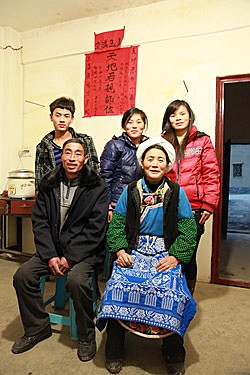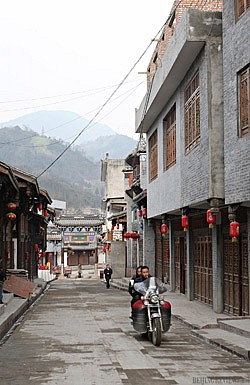|
 |
 |
|
FAMILY UNITED: Luobo Village's accountant, Wang Guorong (left front), and his family members at their new home that was built after the 2008 Wenchuan earthquake (LI LIJUAN) |
NEWBORN VILLAGE: Wenchuan's Laoren Village, a place that is famous for its longevity, is given a facelift by aid volunteers from Guangdong Province's Foshan City, January 24, 2010 (ZHAO XI) |
The devastating 2008 Sichuan Province earthquake froze life for Luobo Village's 49-year-old Wang Guorong. He had been the village accountant, but the disaster sent his family into ruin, including destroying 56 cherry trees nearly ready for harvest.
The town, inhabited for generations by the Qiang ethnic group, is located 1,950 meters above sea level and has taken on the nickname of "the village in the clouds."
Luobo was only 18 km from the earthquake's epicenter, which tore the village apart and destroyed Wang's house.
In response to the devastation, the village began receiving assistance from Jiangmen, in south China's Guangdong Province, which is helping to get it back on its feet.
A Jiangmen construction team began three months after the quake to build new houses for Wang and other villagers on a site 1 km from the old village. In October 2009, Wang's family moved into their new two-story house that was built in traditional Qiang style.
The reconstruction plan for Luobo dictates that a one-story, 52-square-meter house will be built for each family by the Jiangmen construction team. Villagers may also choose to build a second story on their own.
The new homes are not a free gift to villagers, who must pay 60,000 yuan ($8,824). With assistance from various sources, however, they are easily affordable.
Like other villagers, Wang received subsidies of 20,000 yuan ($2,941) from the government, a contribution of 10,000 yuan ($1,470) from Guangdong Province, a donation of 10,000 yuan from Chinese living abroad and a low-interest loan of 20,000 yuan from the bank.
"I am very satisfied with my new house. It has eight bedrooms, two guest rooms, a kitchen and a toilet," said Wang.
Wang's new home did not come empty, either. The guest room on the second floor had a new sofa, a large-screen color TV, a DVD player and an audio system. He even received government assistance to buy his new washing machine.
"I paid 799 yuan ($118) for this washing machine. It normally sells for 918 yuan ($135). The project to bring home appliances to rural areas provided a subsidy for me to buy this new washing machine," Wang said.
And his family had good income last year. "My cherries and peppers sold for more than 6,000 yuan ($882), my wife earned 6,000 yuan by working on the construction site and my two daughters earned 2,000 yuan ($294) working in cities. My household income doubled between 2008 and last year," he said.
Promising future
Wang's children have trickled back home before the Spring Festival, which fell on February 14 this year. This has given him great satisfaction and consolation. He is now laying more hopes and expectations than ever on them.
"My second daughter got married recently and is starting her new life," he said.
After finishing school in Jiangmen, his 16-year-old son is now learning computer science at a Chengdu vocational school.
"The local government provided an extra three years of free education in addition to the free nine-year compulsory education," he said. "Although we suffered from the destructive damage of the earthquake, the assistance and support we have received have made life even better than before the earthquake."
He plans to seize the opportunity to make a better life for his family, he said.
The local government said a restoration project for the old ruined village will be launched in March and is expected to be finished in three years. The "village in the clouds" will then reappear.
Luobo will focus on developing tourism and agriculture and the villagers' income will see a dramatic increase in the future, said local officials.
The earthquake also taught villagers to value giving over taking. Recently, more than 900 villagers donated 14,000 yuan ($2,059) for earthquake victims in Haiti. Wang offered 200 yuan ($29).
"I used to be a quake victim myself. Without assistance from my country and the international community, I could not have a life like I do today. Although I am not rich, I still want to help the victims in Haiti," Wang said. | 